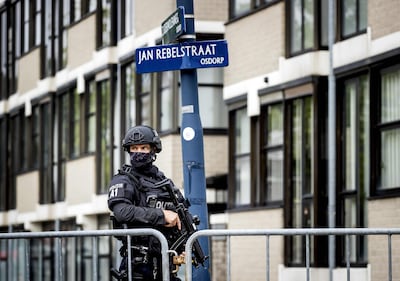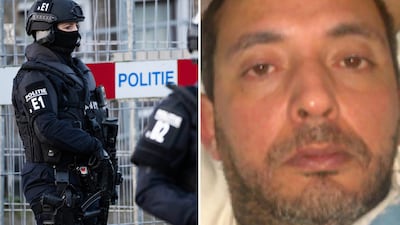Ridouan Taghi, the leader of a drugs cartel nicknamed the “Mocro-Mafia”, has been sentenced to life in jail for his part in a murderous campaign in the Netherlands, which prosecutors called a "well-oiled killing machine”.
Taghi, 46, the Moroccan-born mastermind of the Amsterdam-based group, was one of Europe's most-wanted men when he was captured in Dubai in 2019.
During his trial, one of the largest in the Netherlands’ legal history, Taghi and 16 alleged members of a drugs cartel faced six counts of murder and attempted murders – including ordering at least 13 hits – between 2015 and 2017, mainly against people suspected of becoming police informants.
Three of them received life sentences, including Taghi.
"We are sentencing all the suspects. Ridouan Taghi gets life in prison," said a judge at the Amsterdam District Court, who for reasons of security asked not to be identified.
Sixteen others received sentences ranging from life to one year and nine months.
The verdict was read out at the highly-secure courthouse, commonly known as The Bunker, on the outskirts of Amsterdam.
Officers armed with automatic rifles and wearing face masks to protect their identities were guarding the building, while drones and a police helicopter circled overhead.
An international arrest warrant had been issued for Taghi in 2018 and officials offered a €100,000 ($118,200) reward for his capture.
Only when a cross-border operation was launched with Dubai Police did a breakthrough come, after officials received a tip-off he was in the Middle East.
It led to a 10-day stakeout at the luxury villa hideout of the Moroccan-Dutch crime lord.
Taghi, 46, was described in court as the mastermind of the Amsterdam-based group, which is regarded as one of the Netherlands' largest cocaine distributors.
The gang is nicknamed the "Mocro-Mafia" because its members are mainly of Moroccan and Antillean origin.
Their crimes include the murder of a man called Hakim Changachi, who was gunned down in Utrecht in 2017 in what prosecutors said was a case of mistaken identity.
Shortly afterwards, police made a breakthrough in the case, when one of the suspected gang members called "Nabil B" handed himself over and agreed to become the prosecution's crown witness.
A new wave of violence followed after Nabil B turned state witness, leaving three people dead in scenes that shocked the nation.
Nabil B's brother was murdered in 2018, his lawyer Derk Wiersum was shot dead outside his house in 2019 and the prominent Dutch crime journalist Peter R de Vries was shot in central Amsterdam as he left a TV studio in 2021.
He died nine days later of his injuries. Prosecutors sought life sentences for three of the suspects in his murder.

Mr de Vries, who had said he was on Taghi's hit list, acted as Nabil B's confidant at the time of his murder.
The court ruled that testimony from Nabil B was trustworthy and could be used as evidence. The witness was also on trial and sentenced to 10 years.
A Dutch subscription TV channel made a fictional series named after the notorious drug gang, set in Amsterdam.
Taghi had denied all the charges and said money spent on a "sham trial could rather have gone to employing more teachers and police, and health care", Het Parool newspaper reported.
None of the suspects made any statements during the trial, which featured several developments that delayed proceedings.
Taghi's lawyer, Inez Weski, was arrested in April, with prosecutors accusing her of passing messages between her client, who was in custody, and the outside world.
Her arrest and detention raised eyebrows in the Dutch legal community. Since released, she has yet to be charged, although she remains a suspect.
New lawyers were appointed for Taghi but they too resigned and he then indicated he would represent himself.
The prosecution's case consisted of more than 800 pages, with evidence not only from Nabil B but also conversations from encrypted devices known as Pretty Good Privacy (PGP) phones, often favoured by criminal organisations.
Dutch criminal law advocate Willem Jan Ausma told Dutch breakfast TV programme WNL. "It's been a six-year process and so much has happened, none of it pleasant."


